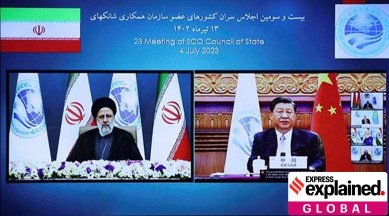Expert weighs in | China view on SCO summit: Iran welcome, need to ‘save’ group from India
Debate is heating up over the role of India in the China-dominated SCO. Here is how strategic affairs experts in China have reacted to the just-concluded SCO summit in New Delhi.

While the membership of the Shanghai Cooperation Organisation (SCO) is growing — with Iran being the newest entrant at the just-concluded 23rd leaders’ summit in New Delhi — debate is also heating up over the role of India in the China-dominated grouping.
India’s association with the SCO began in 2005 as an Observer country, and it became a full Member State at the Astana Summit in 2017. Interestingly, in China, despite the government eventually “allowing” India’s accession, the strategic affairs community was opposed to the membership, comparing India’s role and presence within the grouping to that of Turkey in North Atlantic Treaty Organization (NATO).
Commenting on the “troublemaker” role of India at the conclusion of the SCO virtual summit in New Delhi, Pan Guang, a well-known Chinese scholar in Shanghai, wrote in an article in the popular Chinese-language digital news platform guancha.cn on July 6: “Many scholars, including me, and former ambassadors and diplomats, opposed India’s entry into the SCO. But the government in Beijing made the decision.”
Observing that the SCO expansion is a very interesting process, Pan, professor at the Shanghai Academy of Social Sciences, recalled the time when India was first accepted as an SCO observer country in 2005. “I remember President Hu Jintao telling Indian leaders that after India joins SCO, there would be a new ‘platform’ for resolving Sino-Indian relations,” he said.
On the contrary, scholars in China maintain, India has actually used its SCO member state position as a “platform” to challenge and in fact embarrass China.
Some observers believe that India was accepted as a full member on Moscow’s insistence, to counterbalance China for pushing Pakistan’s membership into the organisation. They say that though China agreed to the Russian viewpoint that Moscow, Beijing, and New Delhi must be united in fighting the US-led Western dominance in Asia, or particularly in Central Asia and Eurasia, in reality, Moscow’s calculation was to woo India on one hand, so it would keep purchasing Russian weapons, and on the other hand, put pressure on Beijing and keep it sandwiched between Moscow and New Delhi.
Further, Beijing was in for a “surprise” when New Delhi, with the standoff in Doklam still continuing, formally joined US, Japan, and Australia at the Quadrilateral Security Dialogue gathering in Manila three months later. What was of even greater concern (to Beijing) was that the Quad – the four-country grouping – had been resurrected “reflecting changing attitudes towards China’s growing regional influence.”
It is pertinent to recall that just like Japan, Australia, and the US, which had been experiencing a steady decline in their respective bilateral ties with Beijing, the impetus for India to consider the importance of the Quad lay in the 73-day eyeball-to-eyeball confrontation on the border in the Doklam area.
Scholars in India and abroad have pointed out that regardless of India joining the SCO and the informal yet “historic” Wuhan and Chennai friendship summits in 2018 and 2019 respectively between Prime Minister Narendra Modi and President Xi Jinping, the Doklam standoff served as the harbinger of deadly the Galwan border clash in June 2020.
At another level, with the entry of Iran into the organisation, many scholars have called for expelling India from the SCO, citing the success of Modi’s official state visit to the US and India living in an “ecstasy soup”. In fact, some in China are already demanding that the SCO urgently introduce an “exit mechanism” and impose appropriate “constraints” on member states.
Such scholars claim that New Delhi tried its best to take a dig at China, and even Russia, by suddenly converting the first Indian presidency summit of the SCO into a mere “two-hour online affair”, which was an “indirect way of showing favor to Washington.”
A joke heard at last year’s SCO summit in Samarkand was that “China brings money, Russia guns, and India dignity into the SCO”. A Chinese observer, irked after the New Delhi virtual summit, claimed: There was no dignity. There was only disharmony, discord, and disagreement!”
Hemant Adlakha is a professor of Chinese at the Jawaharlal Nehru University in New Delhi. He is also Vice-Chairperson and Honorary Fellow at the Institute of Chinese Studies (ICS), Delhi.